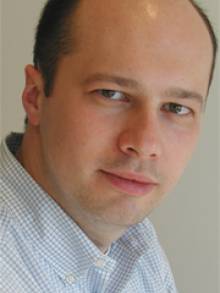Erik Korolev
MPA in Health Policy & Management
-
2003

When Erik Korolev was graduating from Wagner, he applied to only one job on the west coast. Having grown up in New York, he focused the majority of his job applications towards organizations in New York and Connecticut. But the chance to take a project manager position at Blue Shield of California in San Francisco, offered him the opportunity to work at a nonprofit, where the organization’s mission is lived everyday. Thus, while it was a big decision to move with his wife (also a native New Yorker) across the country, it was a fulfilling choice, especially coming from a background in for-profit healthcare, which Erik explains, “is very different.”
Blue Shield is one of the last two nonprofit health insurance providers left in California, and as a senior project manager there, Erik supervises a strategic program called “Cost of Healthcare,” which works to control the medical expenses that the organization incurs. For every dollar collected in premiums, Blue Shield pays out 80-85 cents for medical care and with medical costs rising significantly every year, Erik’s team strives to ensure Blue Shield is providing “the right level of care in the most cost effective way, and at the right price.” This allows the organization to make health insurance more affordable to its customers and control member costs. Erik explains that his challenge is “to find initiatives that control healthcare prices without sacrificing quality.” This is not an easy task, but Erik enjoys leading a program that is directly linked to Blue Shield’s mission, which is “to ensure all Californians have access to high-quality health care at a reasonable price” [source]. Erik is responsible for a portfolio that delivers between $20 and $30 million in cost-of-care savings each year. The more money that is saved, he explains, the more Blue Shield is able to offer affordable rates, which in turn allows more people to access healthcare coverage.
Coming from Wagner with an MPA in health policy and management and concentrations in finance and management, Erik feels he has an edge amongst his colleagues, most of whom have regular MBAs. His classes at Wagner gave him a firm grasp on understanding the complexity of today’s health care systems from the hospital and provider side of the table. When he meets with provider representatives, he understands their concerns and easily recognizes the issues they face. He appreciates having familiarity with perspectives on healthcare from multiple constituencies.
Although Erik has moved all the way across the country from Wagner, he still stays closely connected with the school. He has volunteered as the regional alumni contact for the San Francisco Bay Area and assists the school with recruiting in the Bay Area as well. Each year he speaks to prospective Wagnerites at a reception for admitted students and alumni, sharing about his experience as a student, his transition from New York to the Bay Area and his career in the healthcare industry. When discussing his career recently, Erik said he believes that ten years from now, this “industry will be very different than what it is today.” As one of the top domestic issues on the agenda, he has watched as healthcare has begun to shift dramatically. There are “a lot of entrepreneurial opportunities” arising, Erik comments, and in the future he’d like to explore new ways to tackle the problems of access and affordability. He’s also interested in working with employer groups to help them make strong decisions. As Erik’s career in healthcare grows and changes, there is one thing those at NYU Wagner hope will remain constant, and that is his kind dedication to the school.